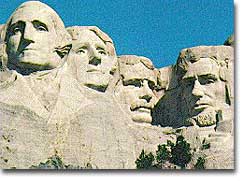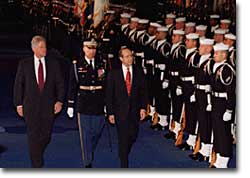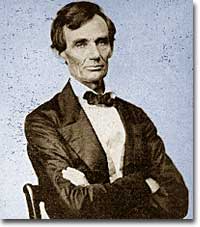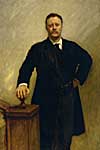How Has The Nature Of Presidential Power Changed Since The Ratification Of The U.s. Constitution?

7a. The Evolution of the Presidency

South Dakota's Mt. Rushmore memorializes four of America's greatest Presidents. Washington, Jefferson, Theodore Roosevelt, and Lincoln are carved into this spectacular monument.
The 21st Century dawned on a very unlike presidency than the 1 created at the stop of the 1700s. Constitutional provisions express the early presidency, although the personalities of the first three — George Washington, John Adams, and Thomas Jefferson — shaped it into a more influential position past the early 1800s. Yet, throughout the 1800s until the 1930s, Congress was the ascendant co-operative of the national government. Then, throughout the residual of the 20th Century, the balance of power shifted dramatically, and then that the executive branch currently has at least equal power to the legislative co-operative. How did this shift happen?
Constitutional Qualifications and Powers
Commodity II of the Constitution defines the qualifications, benefits, and powers of the presidency. The President must exist at to the lowest degree 35 years old, and must take resided in the U.s.a. for no fewer than fourteen years. Presidents must exist "natural born" citizens. The Constitution states that the President should be paid a "bounty" that cannot be increased or decreased during a term. Congress determines the salary, which increased in 2001 to $400,000, doubling the salary that was set dorsum in the 1960s.
Article 2 of the Constitution
Section 1.
The executive Ability shall be vested in a President of the U.s. of America. He shall concord his Office during the Term of iv Years, and, together with the Vice President, called for the aforementioned Term, be elected, every bit follows:

As Commander in Chief of the Armed Forces, the President is responsible for the Army, Navy, Air Forcefulness, Marine Corps, and Declension Guard. Hither, President Clinton reviews troops at the Fort Myer base in Virginia.
Each State shall appoint, in such Manner as the Legislature thereof may direct, a Number of Electors, equal to the whole Number of Senators and Representatives to which the State may exist entitled in the Congress: but no Senator or Representative, or Person holding an Office of Trust or Profit under the United States, shall exist appointed an Elector.
[The Electors shall run into in their corresponding States, and vote by Ballot for two Persons, of whom i at to the lowest degree shall not exist an Inhabitant of the same State with themselves. And they shall make a Listing of all the Persons voted for, and of the Number of Votes for each; which List they shall sign and certify, and transmit sealed to the Seat of the Regime of the United states, directed to the President of the Senate. The President of the Senate shall, in the Presence of the Senate and House of Representatives, open all the Certificates, and the Votes shall then exist counted. The Person having the greatest Number of Votes shall be the President, if such Number be a Majority of the whole Number of Electors appointed; and if there be more than one who have such Majority, and have an equal Number of Votes, so the Business firm of Representatives shall immediately choose past Election one of them for President; and if no Person accept a Bulk, and so from the v highest on the List the said House shall in like Manner choose the President. But in choosing the President, the Votes shall be taken by States, the Representation from each State having 1 Vote; A quorum for this Purpose shall consist of a Fellow member or Members from ii thirds of united states of america, and a Majority of all States shall be necessary to a Pick. In every Instance, subsequently the Selection of the President, the Person having the greatest Number of Votes of the Electors shall be the Vice President. But if there should remain two or more than who have equal Votes, the Senate shall choose from them by Ballot the Vice President.]*
*Changed past the Twelfth Amendment.
The Congress may determine the Time of choosing the Electors, and the Day on which they shall give their Votes; which 24-hour interval shall exist the same throughout the United States.
No Person except a natural built-in Citizen, or a Citizen of the United States, at the time of the Adoption of this Constitution, shall be eligible to the Office of President; neither shall any person be eligible to that Part who shall not accept attained to the Age of thirty v Years, and been fourteen Years a Resident within the Us.
[In Case of the Removal of the President from Part, or of his Death, Resignation, or Disability to discharge the Powers and Duties of the said Office, the Same shall devolve on the Vice President, and the Congress may by Law provide for the Example of Removal, Death, Resignation or Inability, both of the President and Vice President, declaring what Officer shall then act as President, and such Officer shall human action accordingly, until the Disability be removed, or a President shall be elected.]*
*Inverse by the Twenty-5th Amendment.

Sixteenth President Abraham Lincoln, captured here in a daguerreotype, strongly defended the preservation of the Union and often acted without congressional consent during the Civil State of war.
The President shall, at stated Times, receive for his Services, a Compensation, which shall neither be increased nor macerated during the Period for which he shall accept been elected, and he shall not receive within that Menstruation any other Emolument from the United States, or whatsoever of them.
Earlier he enter on the Execution of his Office, he shall take the post-obit Oath or Affirmation:--"I practise solemnly swear (or assert) that I volition faithfully execute the Function of President of the United States, and will to the best of my Ability, preserve, protect and defend the Constitution of the United states of america.''

Theodore Roosevelt was a grand statesman, conservationist, warrior, and sportsman, who said leaders must "speak softly and carry a large stick."
Section 2.
The President shall be Commander in Main of the Army and Navy of the United States, and of the Militia of the several States, when called into the actual Service of the United States; he may require the Opinion, in writing, of the primary Officer in each of the executive Departments, upon whatever Subject relating to the Duties of their respective Offices, and he shall have Power to grant Reprieves and Pardons for Offenses confronting the Usa, except in Cases of Impeachment.
He shall have Power, by and with the Advice and Consent of the Senate, to brand Treaties, provided ii thirds of the Senators present concur; and he shall nominate, and past and with the Communication and Consent of the Senate, shall appoint Ambassadors, other public Ministers and Consuls, Judges of the Supreme Courtroom, and all other officers of the United states, whose appointments are not herein otherwise provided for, and which shall be established by constabulary: but the Congress may by Law belong the appointment of such inferior officers, as they call up proper, in the President alone, in the courts of law, or in the heads of departments.
The President shall have Power to fill upwardly all Vacancies that may happen during the Recess of the Senate, by granting Commissions which shall elapse at the End of their next Session.
Section iii.
He shall from time to time give to the Congress Information of the State of the Spousal relationship, and recommend to their Consideration such Measures every bit he shall judge necessary and expedient; he may, on extraordinary Occasions, convene both Houses, or either of them, and in Case of Disagreement between them, with Respect to the Time of Adjournment, he may adjourn them to such Time as he shall think proper; he shall receive Ambassadors and other public Ministers; he shall take Care that the Laws be faithfully executed, and shall Commission all the Officers of the United States.

Section iv.
The President, Vice President and all civil Officers of the United States, shall be removed from Role on Impeachment for, and Conviction of, Treason, Blackmail, or other high Crimes and Misdemeanors.
The Constitution assigned the following powers to the President:
- Military machine power. The founders saw the importance of a strong military to protect the country and its citizens, but they named the President, a civilian, the "commander in primary" of the armed services. They were e'er mindful of checking and balancing power, and they did not desire a military machine general to seize the authorities.
- Diplomatic power. The President was given the power to brand treaties with foreign nations, merely non without the "advice and consent" of the Senate. Two-thirds of the senators must agree to a treaty the President signs, and if they do not, the treaty is not valid. The Constitution also provides that the President "shall receive ambassadors and other public ministers," which includes the duty of recognizing new nations, representing the United States to other countries, and performing related formalism duties.
- Engagement ability. The Constitution gives the President the responsibility to engage "Ambassadors, other public Ministers and Consuls, Judges of the Supreme Court, and all other Officers of the United States." Once again, the Senate gives its "advice and consent," then that all appointments must be confirmed by a majority of the Senators voting.
- Legislative power. The President was given the ability to veto legislation. Every bill that passes both houses of Congress must be submitted to the President, although Congress tin can get around the President in several means. If the President fails to sign the bill within ten days, it becomes police force anyway. Likewise, Congress may override a presidential veto by a vote of two-thirds of each house.
The Strengthening of the Presidency
Because the Constitution gave the President such limited ability, Congress dominated the executive branch until the 1930s. With only a few exceptions, Presidents played 2nd dabble to Congress for many years. However, those exceptions — Andrew Jackson, Abraham Lincoln, Theodore Roosevelt, and Woodrow Wilson — provided the basis for the turning indicate that came with the presidency of Franklin Roosevelt in the 1930s.
Andrew Jackson, greatly loved by the masses, used his prototype and personal ability to strengthen the developing party system past rewarding loyal followers with presidential appointments. Jackson as well made extensive utilise of the veto and asserted national ability by facing down South Carolina's nullification of a federal tariff law. Jackson vetoed more bills than the six previous Presidents combined.
Abraham Lincoln assumed powers that no President earlier him had claimed, partly considering of the emergency created by the Civil War (1861-1865). He suspended habeas corpus (the correct to an appearance in court), and jailed people suspected of disloyalty. He ignored Congress by expanding the size of the regular army and ordering blockades of southern ports without the consent of Congress.
Theodore Roosevelt and Woodrow Wilson each expanded the powers of the presidency. Roosevelt worked closely with Congress, sending information technology letters defining his legislative powers. He also took the lead in developing the international power of the United states. Wilson helped codify bills that Congress considered, and World War I afforded him the opportunity to take a leading role in international affairs.
Franklin Roosevelt, who was elected iv times to the presidency, led the nation through the crises of the Groovy Depression and World War Ii. Roosevelt gained power through his New Deal programs to regulate the economy, and the war required that he lead the country in foreign affairs besides.
So, the powers of the modern presidency have been shaped by a combination of constitutional and evolutionary powers. The forceful personalities of stiff Presidents have expanded the office far beyond the greatest fears of the antifederalists of the belatedly 1700s.
Source: https://www.ushistory.org/gov/7a.asp
Posted by: grangehathrugh.blogspot.com


0 Response to "How Has The Nature Of Presidential Power Changed Since The Ratification Of The U.s. Constitution?"
Post a Comment